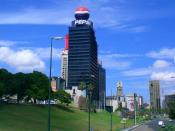Pepsi � PAGE �1�
Effective Communication Case Study Analysis Paper (Pepsi)
University of Phoenix
09 January 2007
Effective Communication Case Study Analysis (Pepsi)
Understanding opinions, facts, thoughts are part of the listening and responding process; all these items hopefully lead up to one common goal, which is effective communication. Effective communication is an art that needs mastering by all individuals regardless of race, religion or ethnic background. A definition of this subject describes this skill as "to help reduce local discomforts for him or her: and to be effective and to ensure that the intendeds primary needs are met well enough" (Gerlach, 2006).
This individual's mother (MOM) could have used this definition and skill on an everyday basis. This highly attainable yet required skill is extremely important within the realm of public relations; it can either make or break an organization when in the crisis mode. The following paper will discuss a media feeding frenzy for the PepsiCo during a catastrophe (syringe in my Pepsi can) and how it was successfully resolved.
The Effectiveness of the Communication between Pepsi and its Intended Publics
Jackson and Center state (2003) in the book Public Relations Practices: Managerial Case Studies and Problems that, "Pepsi is the number two diet soft drink creator behind Coca Cola" (p.8). Therefore, they have a wide variety of communication publics. Their intended audiences range from employees, consumers, competitors and government regulatory agencies (Food and Drug Administration, FDA). PepsiCo's communication is extremely effective; the number of sales per quarter, and the reception of their globalized product calculate this.
PepsiCo's Different Publics (Internal and External)
PepsiCo had several publics to contend with. According to their crisis coordinator Madeira they had four primary publics that needed addressing, they were the news media, customers, employees, and the local Pepsi-cola bottlers...


